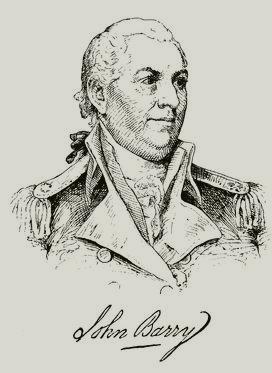John Barry, Naval Hero - A Klos Family Project - Revolutionary War

Click on an image to view full-sized
John Barry
Father of the US Navy
BARRY, John, naval officer, born
in Tacumshane, county Wexford, Ireland, in 1745; died in Philadelphia, 13
September 1803. He followed the sea from childhood, and, making his home in
Philadelphia at the age of fifteen, acquired wealth as the master of a vessel.
He offered his services to congress at the opening of the revolutionary war, "abandoning
the finest ship and the first employ in America" (his own words), and,
in February 1776, was given the command of the "Lexington," in
which he made the first capture of a British war vessel accomplished by an
American cruiser, that of the tender "Edward."
He was then transferred to the frigate "Effingham." During
the winter of 1776-'7, while navigation was closed, he commanded a company of
volunteers and assisted in the operations at Trenton with some heavy artillery.
In 1777, with four boats, he captured a British war-schooner in the Delaware
without losing a man. For some time he acted as aide-de-camp to General
Cadwalader. When the British occupied Philadelphia in the latter part of 1777,
he took the "Effingham" up the Delaware to save her from
capture. The enemy offered him a heavy bribe to deliver up the ship, and finally
succeeded in destroying her by fire.
In 1778 he was assigned to the command of the "Raleigh,"
which was pursued and driven on shore by a British squadron, after making a
gallant resistance. In February 1781, in the "Alliance" he
conveyed Colonel Laurens on a special mission to France, and cruised with
success until he put in for repairs in October. In a desperate combat he
captured the "Atalanta" and the "Trepassy,"
and was severely wounded. After carrying Lafayette
and Noailles to France, he cruised in the West Indies, and in the early part of
1782 fought a sharp battle with an English ship, until the appearance of a
superior force compelled him to desist, to avoid capture. On the establishment
of the new navy in 1794, he was named the senior officer, with the rank of
commodore. He commanded the frigate "United States," the
building of which he had superintended.



























































